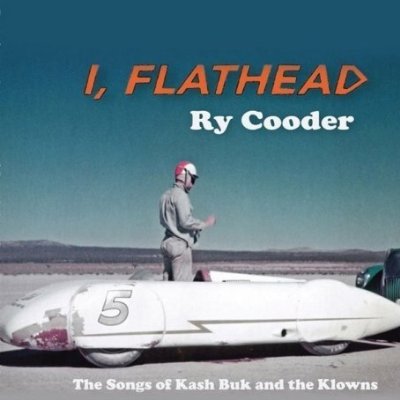

Between 1980 and 2000 Cooder only made four studio albums, concentrating instead on soundtrack work (he scored 12 movies during that period). The second of those four studio albums, 1982's The Slide Area, was the first of his studio albums to feature more than one original song (putting aside his soundtrack to The Long Riders), and in a way it's a shame because The Slide Area is in some ways his least successful record. It opens with a completely misplaced 'UFO Has Landed in the Ghetto', which is a kind of funk-rock song which really grates and is totally at variance with everything else on the album. There are some real highlights (the soulful blues-rock deconstruction of 'Blue Suede Shoes' is priceless, and 'Mama, Don't Treat Your Daughter Mean' is great), but most of the song choices are either too left-field or just don't really work. In 1986 Cooder wrote an absolutely brilliant score for not very good movie Crossroads. In some ways it sounds much more like a proper studio album than a soundtrack as most of the numbers are full songs. There is some just great stuff on Crossroads. It's an even match of covers and originals, all with a solid blues bent, as befits the movie, and it's an excuse for Cooder to really show off just how superb his slide guitar playing is, as well as how unique and enlivening his particular style of mangling the blues really is.


Next up is one of the true giants of soundtrack work, Paris, Texas (1988). As experimental as it is moving, as unnerving as it is beautiful, it's a soundtrack that broke new ground in every way and has had a deep influence on a huge variety of musicians in all kinds of fields. It's an exercise in ambience, created almost exclusively through echoing acoustic slide guitar work, the notes are few and far between and it sounds like the desert from which the movie's lead character mysteriously appears at the start of the film. It's spacious in an extreme sense, with occasional rattling noises as percussion and hugely reverbed guitar work which quietly and slowly works it's way along. It's an astonishing record, hugely evocative and deeply emotionally engaging. There are one or two pieces which are slightly out of style, but even they are mood scenes - 'Cancion Mixteca' is the only song, but it's sung in a woozy, quavering fashion by Harry Dean Stanton (in Spanish) in a way that makes it fit in perfectly well amongst the atmospherics. The other is 'I Knew These People' which is a lengthy excerpt of dialogue from the film (and one of the saddest bits of dialogue in movie history) over which Cooder plays the most subtle of backings. The whole album is truly a masterpiece and an astonishing exercise in demonstrating how less can sometimes be so, so much more.

Since 2000 Cooder has returned more full-time to his studio work, and in this appears, at least in part, to have been provoked by a great political engagement. Following his work in Cuba on the Buena Vista Social Club, his return to the US seems to have fired him up to a great degree and all six of his albums since 2005 have been fiery leftist missives and which are also some of the best musical work of his career. 2005's Chavez Ravine is an amazing amalgam of musical styles taking in pretty much everything going, particularly centering on music from the Latin Americas, to tell the exceedingly sordid story of the bulldozing in the 1950's of a part of LA which housed a percentage of its Mexican population to build the Dodgers stadium. Many of the musicians and many of the songs on the album are from the time and area and a feeling of authenticity permeates throughout. The songs are sung by a variety of performers, including Cooder, half in Spanish and half in English and the idea appears to have been to recreate the kind of musical and broader cultural atmosphere that existed in Chavez Ravine and throughout LA at the time. So the feel is old-fashioned, old-time, with rhumbas and bossa rhythms, folk and R&B all mixed in together and it's amazingly successful at creating its atmosphere, while never sounding quaint or anachronistic. It's a really very great album.

I, Flathead (2008) is another politically charged record, although rather more subtly so than Chavez Ravine, and it shares that record's inspiration in music of the 50's, and in some cases even earlier. There is a lot less of the Latinate stuff on I, Flathead and a lot more of Cooder's trademark funked and popped up blues. Nonetheless it still has a strangely melancholy feel to it and despite a few blazing rock songs it has a langourous and heat-hazed air about it. Interestingly, I, Flathead and the preceding album (My Name is Buddy which unfortunately I haven't got) are the first two albums (not including his soundtrack work) that Cooder has actually written entirely himself, and that may go some way to explaining why I, Flathead is so particularly idiosyncratic. It's another very fine album, but it's not up to Chavez Ravine's exceptionally high standard.

No comments:
Post a Comment